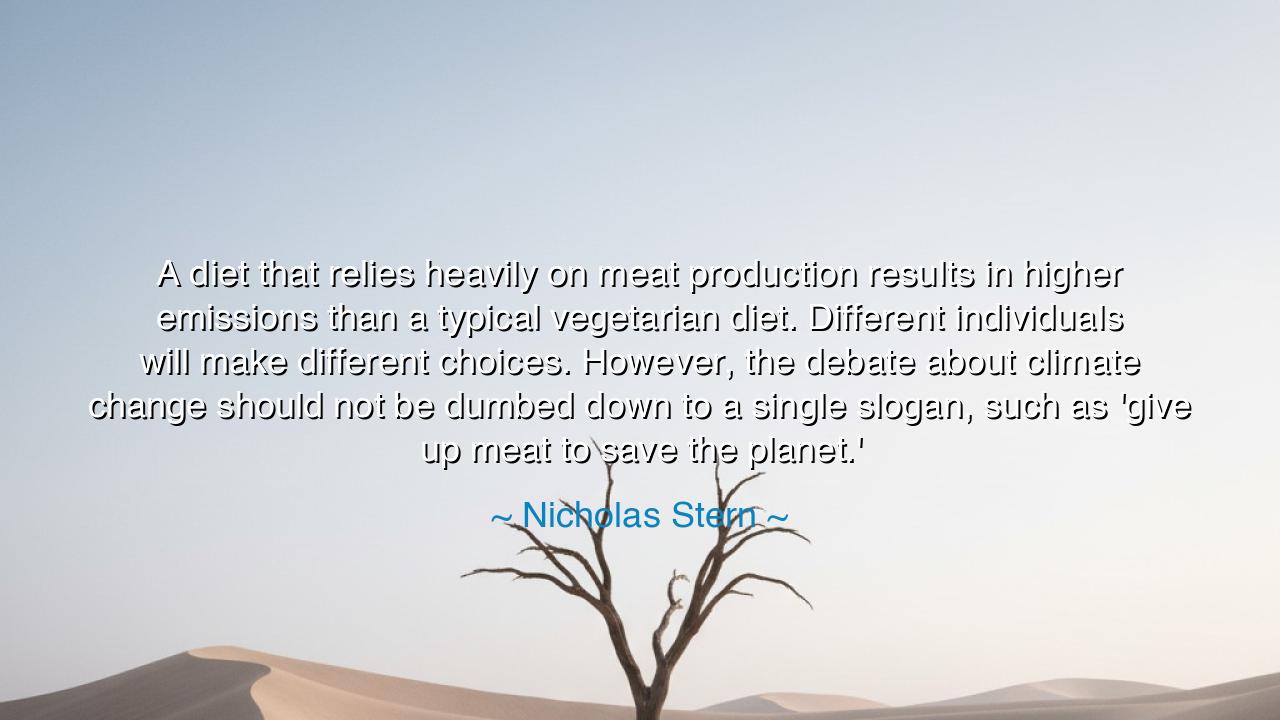
A diet that relies heavily on meat production results in higher
A diet that relies heavily on meat production results in higher emissions than a typical vegetarian diet. Different individuals will make different choices. However, the debate about climate change should not be dumbed down to a single slogan, such as 'give up meat to save the planet.'






In the age-old pursuit of wisdom and balance, there comes a time when the deep and profound connection between our actions and their consequences on the world around us must be acknowledged. Nicholas Stern, a voice of reason in the debate surrounding climate change, offers a thought-provoking perspective: "A diet that relies heavily on meat production results in higher emissions than a typical vegetarian diet. Different individuals will make different choices. However, the debate about climate change should not be dumbed down to a single slogan, such as 'give up meat to save the planet.'" These words remind us of an ancient and timeless truth: complexity and balance are the hallmarks of true understanding, and sustainability requires more than simplistic solutions.
The great philosophers of the ancient Greeks understood that the pursuit of knowledge was not a matter of reducing the world to simple dichotomies, but of embracing its complexity. Socrates, the master of dialogue, famously believed that the pursuit of truth required questioning everything and acknowledging that our world could not be understood through oversimplification. In the same vein, Stern’s words caution against the reduction of the climate crisis to a single, catch-all slogan. He challenges us to acknowledge the multifaceted nature of climate change and the ways in which our dietary choices, among other actions, interact with the environment. To reduce such a vast and intricate issue to a slogan is to ignore the nuance that the ancients understood was necessary for true wisdom.
Consider the teachings of Aristotle, who believed that virtue lay in the balance between extremes. For him, virtue was not an absolute, but a relative measure—a midpoint between excess and deficiency. Just as Socrates would argue that we should never accept simplistic answers without thorough questioning, Aristotle would suggest that the solutions to climate change are likely not to be found in extreme positions, but in thoughtful, balanced approaches that consider all aspects of the problem. Stern's assertion—that meat consumption alone is not the sole cause of environmental degradation—reminds us of Aristotle’s wisdom: we must find a middle ground in our approach to sustainability, weighing the effects of different practices and choices rather than following any single extreme solution.
In the realm of Roman philosophy, the teachings of Cicero also resonate with Stern’s call for balance and understanding. Cicero emphasized the importance of moderation and reflection, and he understood that true leadership required careful consideration of all sides of an issue. Cicero would have likely cautioned against any solution to the climate crisis that oversimplified the situation, urging instead a more thoughtful, comprehensive approach. In this way, Stern reflects the Roman view: complex problems demand complex solutions, and no single action—whether the giving up of meat or the pursuit of other actions—will alone be sufficient to address the intricate web of factors that contribute to climate change.
The Buddhists, too, teach us about the importance of recognizing the interconnectedness of all things. The Buddha often spoke of the middle way, a path that avoids the extremes of indulgence and deprivation. In the same way, Stern’s critique of the oversimplified slogan urges us to consider the interconnections of diet, emissions, and the broader environmental impact. The path to sustainability lies not in extreme measures, but in mindful awareness of how our choices affect the whole system. Whether it is meat consumption, energy use, or waste production, the Buddhist principle teaches us to approach climate change with balance and mindfulness, understanding the ripple effects of each decision.
In the life of Alexander the Great, we also see the value of careful, thoughtful decisions in the face of immense challenges. Alexander, while known for his conquests and military strategies, also understood the importance of maintaining balance in his forces—never overextending, but always calculating the impact of his decisions. Similarly, Stern advocates for a broader understanding of the climate issue, cautioning against the single-minded focus on meat. In our fight against climate change, as in Alexander’s campaigns, victory comes not through simplistic solutions, but through strategy, foresight, and a recognition of the complexities at play.
The lesson Stern imparts is both clear and profound: the pursuit of sustainability and environmental balance is not found in slogans or extremes, but in thoughtful and comprehensive action. The ancient philosophers, from Socrates to Cicero, to the Buddha, all understood that true wisdom lies in recognizing complexity, embracing moderation, and seeking balance in all things. In the same way, climate change cannot be solved by simply giving up meat, nor by relying on any singular action or policy. The path forward is one that recognizes the interconnectedness of all aspects of our world and takes mindful, holistic action that accounts for the myriad factors contributing to environmental harm.
As you consider the role you play in the world and the choices you make, remember the wisdom of the ancients. Seek to embrace balance in your life, and understand that no single action—whether in diet, energy use, or consumer habits—will solve the grand challenges of our time. Instead, work toward mindful, thoughtful solutions that consider the broader impact of your decisions. In this way, you can contribute to the healing of the world in a way that honors the interconnectedness of all things, just as the ancients taught.






AAdministratorAdministrator
Welcome, honored guests. Please leave a comment, we will respond soon